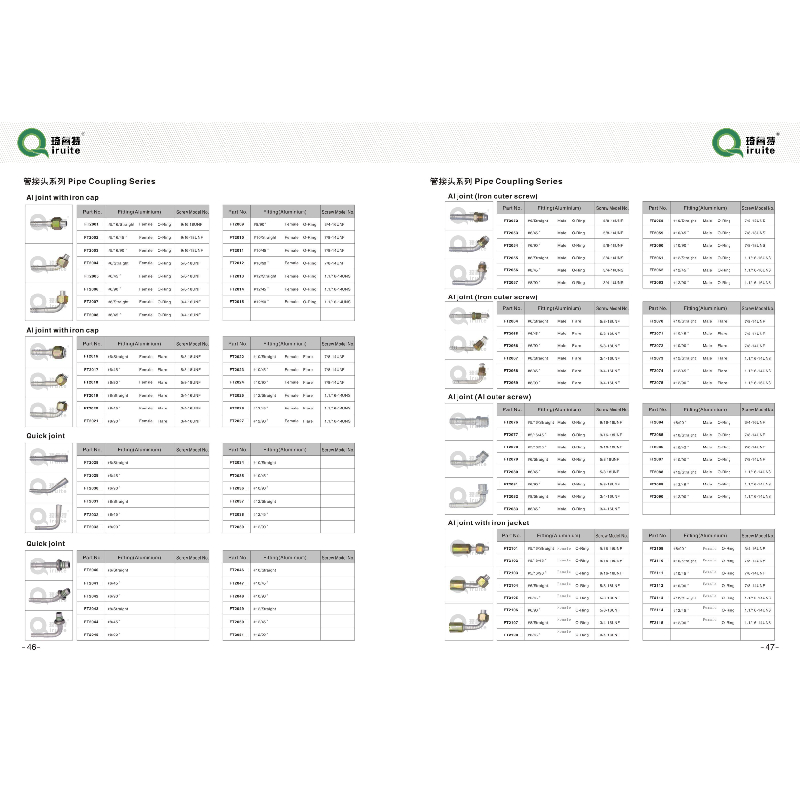Quick Release Ball Joint: Tool-Free, Durable—Why Choose Us?
A Field Guide to the Quick-Connect Era: what a quick release ball joint really needs to deliver
If you wrench on HVAC lines, mobile hydraulics, or even EV thermal loops, you already know this: downtime is expensive and fittings either make your day… or ruin it. Lately, the market has moved hard toward compact aluminum couplings with positive O-ring sealing. The Pipe Coupling Type from Ningjin County, Hebei (yes, I visited that cluster—busy, efficient, surprisingly modern) is a good example of a practical, service-friendly quick release ball joint-style connection used in tight spaces.

What’s trending (and why it matters)
- Lightweight alloys: aluminum 6061-T6 is displacing brass/steel for weight and corrosion reasons.
- Leak-proof O-ring interfaces (ORFS/UNF): fewer callbacks, less refrigerant loss, greener ops.
- Serviceability: 0°, 45°, 90° elbows to clear crowded engine bays and panels—quicker swaps.
- Traceability: QR/laser marking and batch-level test logs. Not flashy; just useful.
Core technical snapshot
Fittings are CNC-machined aluminum with female O-ring seats and 9/16-18 UNF threads. Real-world pressure ratings vary by hose and assembly, but in HVAC/thermal duty you typically see low-to-mid MPa ranges; hydraulics can be higher with proper design. The “ball‑joint” nickname comes from the swivel-friendly geometry and angled bodies that make routing less of a wrestling match. Many customers say the 45°/90° bodies are the difference between a 10‑minute job and a two-hour headache.
Product specifications (Pipe Coupling Type)
| Model | Geometry | Port/Thread | Material | Notes |
|---|---|---|---|---|
| FT2001 | #5/16 Straight, Female O‑Ring | 9/16‑18 UNF | Aluminium (≈6061‑T6) | Compact, general routing |
| FT2002 | #5/16 45°, Female O‑Ring | 9/16‑18 UNF | Aluminium (≈6061‑T6) | Clearance for tight panels |
| FT2003 | #5/16 90°, Female O‑Ring | 9/16‑18 UNF | Aluminium (≈6061‑T6) | Tightest bend, service-friendly |

Process flow, testing, and standards
- Materials: Aluminum 6061‑T6, O‑rings in FKM/NBR (70±5 Shore A, application‑dependent).
- Methods: CNC turning/milling, deburring, T6 heat treatment, optional anodizing.
- Dimensional control: thread gauges (UNF), surface roughness Ra ≈ 1.6 μm typical.
- Pressure and burst: tested per ISO 19879; proof ≥1.5× and burst ≥4× working pressure (assembly‑dependent).
- Corrosion: ISO 9227 NSS ≥ 96 h common; premium builds reach 240 h+.
- Leak integrity: helium/nitrogen sniff testing to ≈1×10⁻³ mbar·L/s (representative).
- Certs: ISO 9001 in place; automotive programs align with IATF 16949 practices.
Application notes
Use these quick release ball joint fittings in bus and truck HVAC, ag sprayers, construction equipment, and HVAC/R service rigs. Torque to spec (don’t guess), lubricate O‑rings lightly, and avoid cross‑threading UNF seats. In fact, a little discipline here saves you most of the leaks people complain about online.
Vendor comparison (real-world buyer questions)
| Vendor | Lead Time | Customization | Testing | Price |
|---|---|---|---|---|
| HoseQRT (Ningjin, Hebei) | 2–4 wks | Angles, anodize, O‑ring, marking | ISO 19879, ISO 9227, batch leak | Value |
| Generic Importer | 4–8 wks | Limited | Basic visual only | Low |
| EU Premium Brand | 1–3 wks | Broad, documented PPAP | Full bench + traceability | High |
Customization checklist
- Angles: straight, 45°, 90°; custom bends on request.
- Threads/ports: 9/16‑18 UNF standard; others on MOQ.
- O‑rings: FKM for higher temp/chemicals; NBR for cost‑sensitive lines.
- Finish: clear/black anodize; laser QR for traceability.

Case notes from the field
- City bus HVAC: switching to 90° bodies trimmed install time ≈30% and cut leak callbacks by half (fleet data, one season).
- Ag sprayer retrofit: 45° couplings cleared a frame rail; technicians reported “no rework” after first week—rare, frankly.
Standards to spec against (start here)
Designers typically reference ISO 8434 (ORFS), SAE J1453, ISO 9227 for corrosion, and ISO 19879 for test methods. For refrigerant lines, pair with SAE J2064‑rated hoses. Real‑world use may vary; validate at system level.
Authoritative references
- ISO 8434‑3: Metallic tube connections — O‑ring face seal (ORFS).
- SAE J1453: O‑Ring Face Seal Fittings.
- ISO 9227: Corrosion tests in artificial atmospheres — Salt spray tests.
- ISO 19879: Metallic tube fittings — Test methods.
- SAE J2064: R‑134a/R‑1234yf Refrigerant Automotive Air‑Conditioning Hose.
- ISO 9001: Quality Management Systems — Requirements.
-
Quick Release Ball Joint – Tool-Free, Durable, Leak-TightNewsNov.13,2025
-
Spiral Guard Hose Protection — Durable, UV-Resistant WrapNewsNov.13,2025
-
SAE J1401 Brake Hose Specifications: Durable, Low ExpansionNewsNov.13,2025
-
SAE J1401 Brake Hose Specifications | DOT-Approved, DurableNewsNov.13,2025
-
Spiral Guard Hose Protection - Abrasion-Resistant, UV-StableNewsNov.10,2025
-
SAE J1401 Brake Hose Specifications | DOT-Certified, DurableNewsNov.10,2025

